
Journal of Empirical Research on Human Research Ethics
Scope & Guideline
Elevating discourse on human research ethics.
Introduction
Aims and Scopes
- Research Ethics in Diverse Contexts:
The journal emphasizes research ethics across various cultural and geographical contexts, exploring how local norms, values, and practices shape ethical considerations in human research. - Informed Consent Processes:
A core focus is on the methodologies and effectiveness of informed consent processes, including innovations in consent techniques and the implications for participant understanding and autonomy. - Ethical Implications of Emerging Technologies:
The journal addresses the ethical challenges and considerations surrounding emerging technologies, such as artificial intelligence, in the context of human research, reflecting on how these technologies impact ethical review and participant welfare. - Community Engagement and Participant Perspectives:
Research that highlights the importance of community engagement and the perspectives of research participants is central, aiming to ensure that ethical practices align with the needs and voices of those involved in research. - Regulatory and Institutional Review Board (IRB) Practices:
The journal critically examines the practices and effectiveness of IRBs and regulatory frameworks in overseeing research ethics, including studies that assess compliance and decision-making processes. - Equity and Inclusion in Research:
An emphasis on promoting equity and inclusion in research practices, especially regarding underrepresented populations, is a consistent theme, reflecting a commitment to social justice in research ethics.
Trending and Emerging
- Interactive and Participant-Centric Consent Models:
There is a growing interest in interactive consent models that enhance participant engagement and understanding, reflecting a shift towards more dynamic and responsive consent processes. - Artificial Intelligence and Ethics:
The exploration of artificial intelligence's role in research ethics is trending, particularly concerning AI's decision-making capabilities in ethical review processes and its implications for human subjects. - Ethical Considerations in Global Health Research:
Emerging themes focus on ethical challenges in global health research, particularly in underrepresented and vulnerable populations, emphasizing the need for culturally relevant ethical practices. - Community-Based Participatory Research (CBPR):
The rise of community-based participatory research approaches highlights an emphasis on collaboration and ethical engagement with communities, ensuring that research benefits those involved. - Mental Health and Vulnerable Populations:
Research addressing ethical considerations for vulnerable populations, particularly in mental health contexts, is increasing, showcasing a commitment to protecting those at greater risk during research. - Data Sharing and Privacy Concerns:
The discourse around ethical data sharing practices and participant privacy is gaining traction, particularly in the context of genomic and health data, reflecting contemporary concerns about data ethics.
Declining or Waning
- Traditional Ethical Frameworks:
There appears to be a waning focus on traditional ethical frameworks that do not adequately address contemporary challenges in research ethics, as the journal increasingly prioritizes innovative and context-specific approaches. - Generalized Consent Models:
Research centered on generalized consent models is less prevalent, suggesting a move towards more nuanced and individualized consent approaches that consider participant autonomy and context. - Historical Case Studies:
The journal has seen a decrease in papers that focus solely on historical case studies of ethical breaches or practices, as empirical research and contemporary applications of ethics take precedence. - Quantitative Assessments of Research Ethics:
There is a noticeable reduction in purely quantitative studies that assess attitudes or compliance without integrating qualitative insights, indicating a shift towards mixed-methods approaches that capture richer data. - Ethics in Non-Human Research Contexts:
Research ethics discussions that focus on non-human subjects or animal research are appearing less frequently, as the journal concentrates more on human-centered ethical issues.
Similar Journals

Trials
Fostering innovation in medicine through rigorous trials.Trials, published by BMC, is a leading open access journal that has been pioneering advancements in the field of medicine and pharmacology since its inception in 2006. With an impressive E-ISSN of 1745-6215, the journal is based in the United Kingdom and operates from its address at CAMPUS, 4 CRINAN ST, LONDON N1 9XW, ENGLAND. Trials is recognized for its impactful contributions to the research community, achieving a Q2 ranking in both the Medicine (miscellaneous) and Pharmacology (medical) categories according to the 2023 category quartiles. This esteemed journal aims to provide a platform for presenting cutting-edge clinical trials and methodological advances, effectively fostering collaboration and innovation among researchers, professionals, and students. The journal's accessibility, supported by its open access model, enhances the visibility and dissemination of vital research findings, ensuring that every contribution reaches a broad audience. As of 2024, Trials continues to be a crucial resource for anyone passionate about exploring new frontiers in medical research.
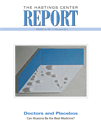
HASTINGS CENTER REPORT
Advancing ethical discourse in healthcare.The HASTINGS CENTER REPORT, published by WILEY, is a leading journal in the fields of bioethics, health policy, and the philosophical underpinnings of healthcare. Established in 1971, this influential publication provides a critical platform for the discussion of ethical issues in health, medicine, and biotechnology, highlighting the intersection between ethical theory and practical health challenges. The journal achieves remarkable academic stature, achieving Q1 rankings in both Issues, Ethics and Legal Aspects and Philosophy, alongside Q2 standings in Health Policy and Health (social science) categories, reflecting its broad interdisciplinary impact. With its wide readership and rigorous peer-review process, the HASTINGS CENTER REPORT serves as an essential resource for researchers, practitioners, and students dedicated to advancing ethical perspectives in health-related discourse. While the journal operates under traditional access options, its contributions resonate deeply within the academic community, fostering informed dialogue on pressing ethical dilemmas and policy considerations in a rapidly evolving healthcare landscape.
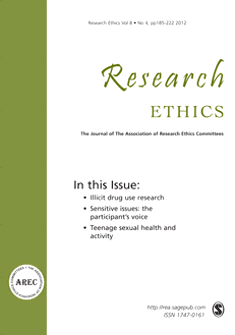
Research Ethics
Fostering Integrity in Academic Inquiry.Research Ethics is a leading journal published by SAGE Publications Inc that fosters scholarly discourse at the intersection of ethical considerations and research practices. As an Open Access platform since 2018, it ensures that critical insights on ethical dilemmas faced by researchers are freely available to a global audience, significantly enhancing its reach and impact. With an impressive impact factor reflected in its Q1 and Q2 rankings in Philosophy and Education respectively for 2023, this journal occupies a vital space for researchers and professionals aiming to navigate the complex ethical landscape of contemporary research. As indicated by its strong Scopus rankings, falling into the 95th percentile in Arts and Humanities (Philosophy) and 77th percentile in Social Sciences (Education), Research Ethics is essential for anyone interested in contributing to or understanding ethical practices in research. The journal encompasses a broad scope, encouraging submissions that explore diverse aspects of research ethics, promoting high standards and integrity across disciplines. Join a community dedicated to advancing ethical research methodologies and contributing meaningfully to the dialogue that shapes the future of moral practices in academia.

Ethik in der Medizin
Fostering Interdisciplinary Dialogue on Health EthicsEthik in der Medizin, published by Springer, is a distinguished journal focusing on the interdisciplinary aspects of ethics in medicine, healthcare policy, and philosophical inquiries related to these domains. With an ISSN of 0935-7335 and an E-ISSN of 1437-1618, this journal serves as a platform for innovative research and discussion from Germany and beyond. The journal boasts an impact in several prestigious categories including Q3 in Health Policy and Q2 in Philosophy as of 2023, reflecting its significant contribution to the discourse on ethical implications in health and medicine. Although not currently Open Access, Ethik in der Medizin provides valuable insights for researchers, professionals, and students interested in the complexities of health ethics and policies, positioning itself as an essential resource in academia. The journal is undergoing important developments, as it converges from 2001 with a publishing timeline extending to 2024, ensuring continued relevance in a rapidly evolving field.
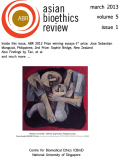
Asian Bioethics Review
Navigating the Complexities of Health EthicsAsian Bioethics Review, published by SPRINGER, is a premier journal indexed with ISSN 1793-8759 and E-ISSN 1793-9453, dedicated to advancing discourse in the interdisciplinary field of bioethics across Asia and beyond. Established in 2015, this esteemed publication has rapidly gained recognition, achieving a Q1 ranking in Philosophy and Q2 in key categories such as Health Policy and Issues, Ethics and Legal Aspects in 2023. With its robust Scopus rankings highlighting its significance across diverse domains—including a remarkable 98th percentile ranking in Philosophy—the journal serves as a vital platform for researchers, ethicists, and policymakers to explore pressing ethical issues and contribute to policy development in health and social sciences. Although not open access, the journal ensures a wide reach through institutional subscriptions, making it an essential resource for students and professionals committed to ethical practices in healthcare. Set in the dynamic backdrop of Singapore, "Asian Bioethics Review" continues to shape the conversation around bioethical practices in the Asian context and globally.
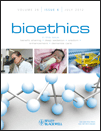
BIOETHICS
Illuminating Ethical Pathways in Healthcare and Policy Decisions.BIOETHICS is a leading academic journal published by Wiley, dedicated to exploring the multifaceted issues at the intersection of healthcare, philosophy, and policy. With an ISSN of 0269-9702 and an E-ISSN of 1467-8519, it has established itself as a critical platform for scholarly discourse since its inception in 1987. The journal holds impressive rankings, featuring in the Q1 category in both Health (social science) and Philosophy, alongside a Q2 rating in Health Policy for 2023. This positions BIOETHICS in the top echelons of its fields, ranking 35th out of 806 in Philosophy and garnering high percentiles across relevant disciplines. By fostering a deeper understanding of ethical implications in medical and social contexts, BIOETHICS serves as an essential resource for researchers, professionals, and students committed to addressing contemporary challenges in health and policy. The journal is accessible through institutional subscriptions and offers an engaging platform for the dissemination of significant research findings and theoretical advancements, paving the way for future exploration in bioethical inquiry.
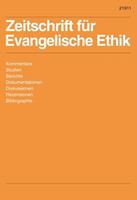
ZEITSCHRIFT FUR EVANGELISCHE ETHIK
Illuminating Ethical Perspectives in TheologyZEITSCHRIFT FUR EVANGELISCHE ETHIK, published by WALTER DE GRUYTER GMBH, is a leading journal in the field of Religious Studies, noted for its critical examination of evangelical ethics and theological perspectives. With an ISSN of 0044-2674 and E-ISSN of 2197-912X, this journal serves as a pivotal platform for scholars seeking to explore contemporary issues through a rigorous ethical lens. Based in Germany, it engages readers with a rich tapestry of interdisciplinary insights, contributing significantly to ongoing discussions within the realm of religious ethics. The journal enjoys a commendable position in the Scopus rankings, placed in the Q3 quartile and ranking #476 out of 644 in its category, reflecting its dedication to quality scholarship. Spanning over two decades, with converged years from 2002 to 2024, it fosters valuable dialogues between researchers, professionals, and students alike. Although not Open Access, the journal's subscription options ensure accessibility to essential scholarly works that can impact both academic and practical applications in religious thought.

Canadian Journal of Bioethics-Revue Canadienne de Bioethique
Exploring the intersection of health and philosophy.Canadian Journal of Bioethics-Revue Canadienne de Bioethique, published by the Universite de Montreal, is a premier open-access journal dedicated to advancing the multidisciplinary field of bioethics since 2012. Emphasizing the complexities of ethical practices in health policy, it serves as a vital resource for researchers, professionals, and students engaged in health and philosophy. With its E-ISSN 2561-4665, the journal's content is freely accessible, fostering knowledge dissemination and academic collaboration. Although categorized in Q4 among Health Policy and Health (social science) in 2023, it holds a respectable Q2 status in Philosophy, reflecting its strong theoretical contributions. Covering a wide scope from 2018 to 2024, the journal encourages robust discourse on pressing ethical issues facing contemporary healthcare systems. For those seeking to connect with the evolving narratives in bioethics, this journal is indispensable.
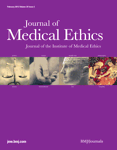
JOURNAL OF MEDICAL ETHICS
Defining the Ethical Boundaries of HealthcareJOURNAL OF MEDICAL ETHICS, published by the esteemed BMJ PUBLISHING GROUP, is a leading journal that has been pivotal in advancing the discourse on ethical issues in healthcare since its inception in 1975. This UK-based journal, with an ISSN of 0306-6800 and an E-ISSN of 1473-4257, is well-regarded for its high-quality, peer-reviewed articles that delve into the complex moral dimensions surrounding medical practices, health policies, and social sciences. With a commendable impact, JOURNAL OF MEDICAL ETHICS has achieved Q1 quartile rankings across multiple categories, including Arts and Humanities and Health Policy in 2023, reflecting its significant influence and relevance in the field—ranked #23 of 552 in Arts and Humanities (Miscellaneous) with a 95th percentile, and #26 in Health Policy with a 91st percentile. Researchers, professionals, and students alike can benefit from the journal's commitment to fostering a deeper understanding of ethical considerations vital to the medical community, although it currently does not offer open access options. The journal's comprehensive examination of issues, ethics, and legal aspects continues to make it an essential resource for those dedicated to shaping the ethical landscape of healthcare.
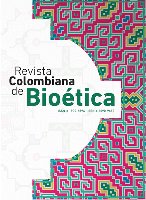
Revista Colombiana de Bioetica
Championing Open Access to Bioethical KnowledgeRevista Colombiana de Bioetica, an esteemed publication under the auspices of UNIV EL BOSQUE, serves as a pivotal platform in the interdisciplinary field of bioethics, offering insights and scholarly discourse relevant to researchers, professionals, and students alike. With an ISSN of 1900-6896 and an E-ISSN of 2590-9452, this open access journal, available since 2010, champions the democratization of knowledge, ensuring that vital research is accessible to all. Nestled in Bogotá, Colombia, the journal's commitment to ethical inquiry and critical thinking in biomedical and health-related disciplines positions it as a crucial resource for those keen on exploring the intersections of ethics, law, philosophy, and health sciences. By facilitating the exchange of innovative ideas and research, the Revista Colombiana de Bioetica aspires to inspire informed dialogue and foster ethical practices within the scientific community and beyond.